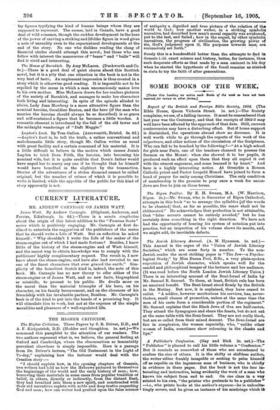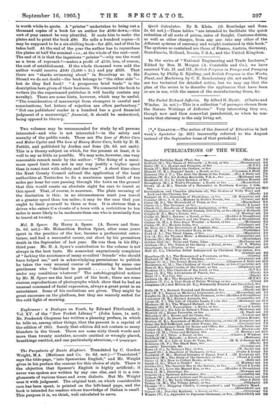A Publisher's Confession. (Gay and Bird. 2s. net.)—The "Publisher" is
pleased to call his little volume a "Confession." But it reminds us somewhat of those who are accustomed to confess the sins of others. It is the shifty or shiftless author, the writer either frankly incapable or seeking to palm himself off as capable on the ingenuous man of business, who is chiefly in evidence in these pages. But the book is not the -less in• teresting and instructive, being evidently the work of a•man who knows his subject from end to end. On one class in a. way related to his own, "the printer who pretends to be a publisher" —i.e., who prints books at the author's expense—he is =hesita- tingly severe, and he gives an instance of his misdoings which it is-worth while.to quote. A "printer" undertakes to bring out a thousand copies of a book for an author for £180 down,—this sort of prey cannot be very plentiful. It costs him to make the plates and to print the book 4'90. He sells a hundred copies—it may be supposed to be a six-shilling book— for £20, and of this he takes half. At the end of the year the author has to repurchase the plates at half the nominal—i.e., at the whole of the real—cost. The end of it is that the ingenious " printer "—why use the word as a term of reproach ?—makes a profit of £150, less, of course, the cost of establishment. If the whole thousand were sold the author would receive £100 (1,000 x 2s.) and pay £225. That there are "sharks swimming about" in Broadway as in the Strand we do not doubt—the book belongs to " the other side"— but do they find food ? "A prosperous brief trade" is the description here given of their business. We commend the book to writers (to the experienced publisher it will hardly contain any novelty). There are some hints, however, which may be useful. "The consideration of manuscript from strangers is careful and conscientious, but letters of rejection are often perfunctory." "Not one publishers' reader in a hundred has a good financial judgment of a manuscript," financial, it should be understood, being opposed to literary.











































 Previous page
Previous page